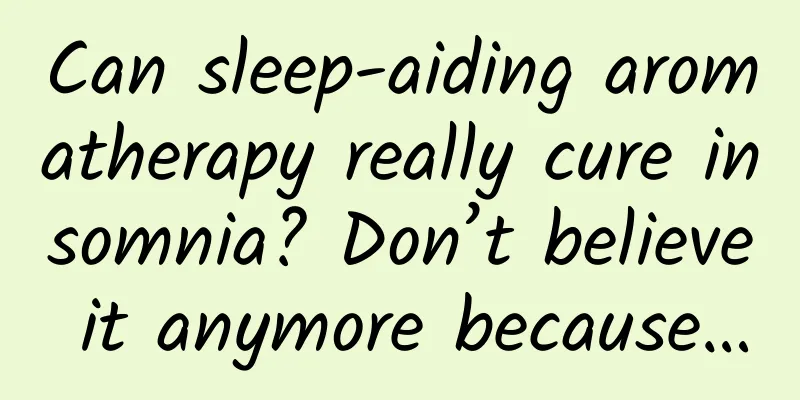Can sleep-aiding aromatherapy really cure insomnia? Don’t believe it anymore because…

|
“Sleep-aiding aromatherapy can cure insomnia.” There are some claims online that simply smelling sleep-aiding aromatherapy before going to bed can solve the problem of difficulty falling asleep or poor sleeping conditions, thereby treating insomnia. Rumor Analysis In fact, this is not the case. The reason why these aromatherapy products dare to promote the effect of "helping sleep" lies in its main ingredients: plant essential oils. However, studies have confirmed that essential oils cannot cure or treat any chronic diseases. Especially for people with secondary insomnia, they still need to seek professional treatment. Moreover, the quality of sleep-aiding aromatherapy on the market is uneven. For health reasons, it is best to use it with caution. Poor sleep is a problem faced by many people. The "China Sleep Research Report 2024" pointed out that the resident sleep index in 2023 was only 62.61, just reaching the passing line, and 5.16 lower than in 2022. To this end, everyone tried their best. In recent years, various "sleep aids" have appeared on the market: sleep-aiding aromatherapy, sleep-aiding incense... claiming that as long as you smell it before going to bed, you can sleep well. Everyone is familiar with aromatherapy. In recent years, it often appears in various exquisite shapes such as candles and crystal stones. It is not only beautiful, but also can make the living space full of fragrance. Copyrighted stock images, no reproduction is authorized But this item, which was previously used to release fragrance, now has the added function of helping you sleep, which makes people wonder: How is this done? Is it really so magical? Does aromatherapy really help with sleep? In fact, the reason why these aromatherapy products dare to promote the effect of "helping sleep" lies in its main ingredient - plant essential oil. Plant essential oil is a concentrated liquid extracted from the flowers, leaves, stems, roots, fruits and seeds of herbal plants by distillation, pressing, extraction and other methods. It often has a unique fragrance of the extracted plant, so it is widely used in perfumes, cosmetics, air fresheners and other products. Essential oils have many small molecules that can be absorbed by the human body through inhalation, and its role has been demonstrated in many experiments. A 2016 study recorded the fluctuations of the brain waves of subjects after inhaling lavender essential oil. The results showed that the theta wave in the brain increased by 4~8 Hz and the alpha wave increased by 8~13 Hz. Theta waves and alpha waves are the two basic waveforms of brain waves. Their appearance means that the brain has entered a resting stage. In the same year, a domestic study more accurately concluded that inhaling lavender essential oil through the olfactory route can safely and effectively improve the insomnia of patients with primary insomnia, and the 1% concentration has a better effect. Seeing this, you may think that these aromatherapy products are indeed not a waste of money. However, don’t forget the two important premises of this conclusion: patients with primary insomnia and 1% concentration of lavender essential oil. Copyrighted stock images, no reproduction is authorized At present, there is no clear conclusion on the cause of primary insomnia, but most people believe that it is related to psychophysiological abnormalities, such as excessive stress or excessive anxiety and depression. The opposite of primary insomnia is secondary insomnia, which refers to insomnia caused by physical illness, mental illness, drug use or drinking. Studies have shown that essential oils cannot cure or treat any chronic diseases. If it is secondary insomnia, sleep-aiding aromatherapy may not help much. In addition, the quality of aromatherapy products on the market is mostly uneven, and there is no clear standard to evaluate its efficacy. As for the content and concentration of added essential oils, it is also unknown, and its effect is difficult to say. Even various types of aromatherapy are still involuted in fragrance, with top notes, middle notes and base notes, adding up to more than a dozen flavors, from salt, dried peppers to summer grass, snow mountain roses, sour, sweet, bitter and spicy. It is difficult for you to judge what ingredients they have added, and whether these ingredients are really safe. In the past, there have been many cases of improper use of essential oils, resulting in facial allergies or even damage. Therefore, it is best to use sleep-aiding aromatherapy with caution. Copyrighted stock images, no reproduction is authorized This sleep aid is also not very reliable It seems to have captured the needs of the public. In addition to sleep-aiding aromatherapy, there are many sleep-aiding devices on the market, such as GABA gummies, but what is their actual effect? After melatonin gummies became popular, GABA gummies also quietly entered the public eye. GABA, also known as γ-amino acid, is an inhibitory neurotransmitter that can calm the brain. Its safety has long been approved by my country, and there is no problem as long as the daily dose does not exceed 500 mg. Image source: e-commerce platform But this does not mean that GABA gummies are useful. Just like "licking rust cannot replenish iron", it is difficult for GABA to enter the brain directly by eating. This is because there is a "blood-brain barrier" in the human body, which firmly serves as a barrier to the brain, and GABA cannot pass its test. Some studies believe that after oral administration of GABA, it will be absorbed in the small intestine and indirectly affect the brain, but some studies have found that after taking CABA, there will be no significant improvement in sleep. In short, there is still controversy about how effective it is, but it is certain that it cannot cure insomnia. If you want to fall asleep, try this If you want to fall asleep, there are some relatively feasible ways. First, try to maintain a regular schedule, go to bed and get up on time, and don't sleep too much during the day. Let the human body maintain a fixed circadian rhythm. Secondly, create a comfortable sleeping environment, make the bedroom quiet, tidy, moderate temperature, and free of odor. Finally, avoid eating a lot before going to bed, especially consuming caffeine, and avoid strenuous activities, including strenuous eye activities, such as swiping your phone, which will keep your brain excited and difficult to fall asleep. If you still have difficulty falling asleep after using many methods, it is best to go to the hospital for professional evaluation. If it is secondary insomnia caused by illness, you still need to follow the doctor's advice and symptomatic treatment. After recovery, the symptoms of insomnia may be relieved. At this time, refer to the above scientific methods of falling asleep, and you may have a good sleep. Looking in the mirror of rumors Such rumors often reduce a complex health problem like insomnia to a single solution, ignoring the multiple potential causes and individual differences of insomnia. Therefore, to identify such rumors, you need to pay attention to the following points: first, verify the source of the information to see if it is released by an authoritative medical institution or expert; second, rationally examine the description of the effect and be wary of absolute terms such as "100% cure"; third, check relevant research to see if there is scientific evidence to support it; and finally, consult professionals to obtain professional advice. References [1]Lee MS, Choi JC (2012). "Aromatherapy for health care: an overview of systematic reviews". Maturitas. 3 (71): 257–260. [2]Schiffer J (March 11, 2021). "Essential Oils May Be Wreaking Havoc on Your Skin". The New York Times. [3]Sowndhararajan, Kandhasamy, and Songmun Kim. 2016. "Influence of Fragrances on Human Psychophysiological Activity: With Special Reference to Human Electroencephalographic Response" Scientia Pharmaceutica 84, no. 4: 724-751. [4] Yang Ying, Wei Kai, Lv Daping. Clinical efficacy of inhaled lavender essential oil on patients with primary insomnia[J]. China Medical Herald, 2016, 13(24): 144-147 [5]Kuriyama K, Sze PY (January 1971). "Blood–brain barrier to H3-γ-aminobutyric acid in normal and amino oxyacetic acid-treated animals". Neuropharmacology. 10 (1): 103–108. [6]Carter, Mancini, Bruce, Ron (2009). Op Amps for Everyone. Texas Instruments. pp. 10–11. ISBN 978-0-08-094948-2. [7]Stein, Michael L. (1999). Interpolation of Spatial Data: Some Theory for Kriging. Springer Series in Statistics. Springer. p. 40. Planning and production Reviewer: Li Jingjing, Professor and Chief Physician, Department of Neurology, Beijing Tiantan Hospital Planning丨Wang Mengru Editors: Wang Mengru, Yinuo Proofread by Xu Lailinlin |
>>: Super bacteria, the "devil of the world" raised by humans
Recommend
Are there any rules to follow in operations and promotion at different stages of product development?
As mentioned before, in the content of Chapter 4,...
Is your phone battery draining too fast? These bad charging habits are the culprits. Let's see if you are one of them.
Many mobile phone users have found that after usi...
Why are there seven suns in the sky?
On August 18, 2024, Chengdu citizens captured a b...
Let’s talk about the exchange of volume in App promotion
Generally speaking, resources for exchanging traf...
Throwing a baby dolphin to death like a ball! How terrible is it that the killer whale has been focusing on bullying for 60 years?
On July 25, 2022, killer whale researcher Deborah...
Geely and BYD compete for the title of "first in thermal efficiency". Why is this related to Xiaomi's "loan marketing"?
On the evening of May 28, BYD released the fifth-...
After studying more than 100 apps, I summarized the patterns and rules of top bar UI design
We may think that the composition of the top bar ...
5 ways to quickly understand your users
When doing operations work, you often need to sta...
Xiaohongshu Professional Account Operation Guide | Brand Private Domain Strategy
On August 2, Xiaohongshu launched major new regul...
Behind every disease, there is a persistent bad habit!
Reviewer of this article: Chen Haixu, Deputy Dire...
The test of the Zhuque-3 test rocket was successful. What is the level of my country's reusable rockets?
Produced by: Science Popularization China Produce...
June stargazing guide: Supermoon and meteor showers add color to the most beautiful Milky Way
Original title: June stargazing guide: "Supe...
7-year Apple user talks about his experience with the phone, from amazing to ordinary, and then to disappointment
Although I have been using an Apple phone, I do n...
Italy's No. 1 patient has recovered and calls on everyone to stay at home!
According to the Italian news agency ANSA, patien...




![Tik Tok live broadcast 1 yuan flash sale, low-cost daily income of 100,000+ gameplay [Video Course]](/upload/images/67cc218aa8468.webp)


![[Creative Cultivation Program] Uncovering the survival secrets of the "ugly and cute" Oriental fish 390 million years ago](/upload/images/67f265e307939.webp)

